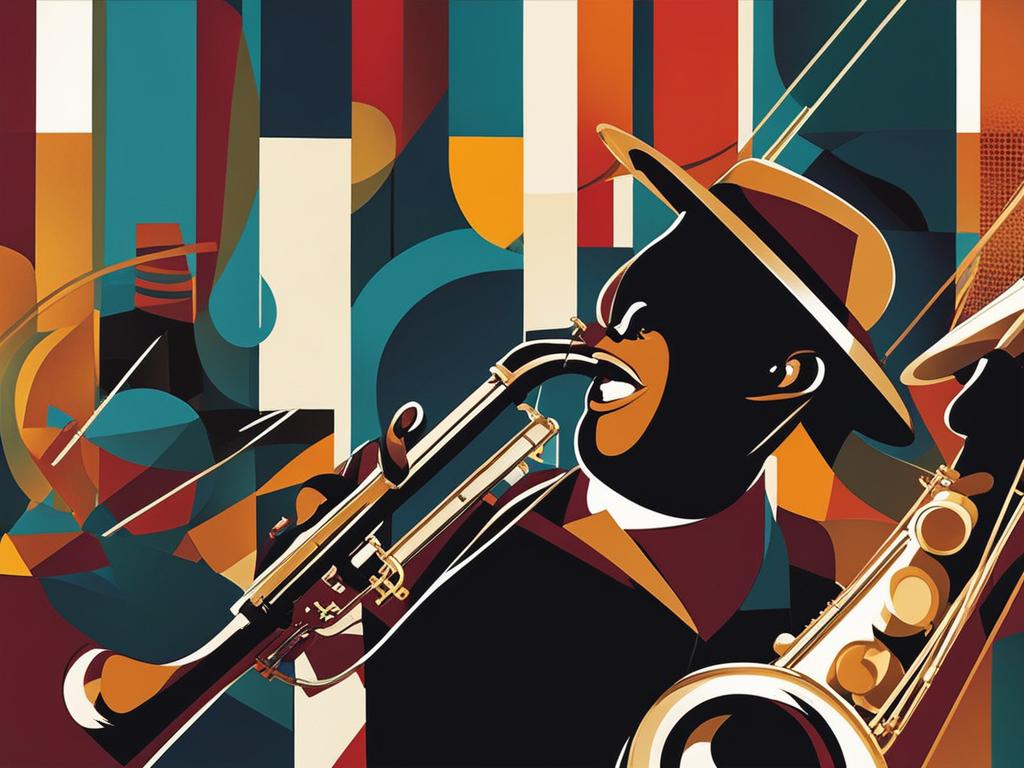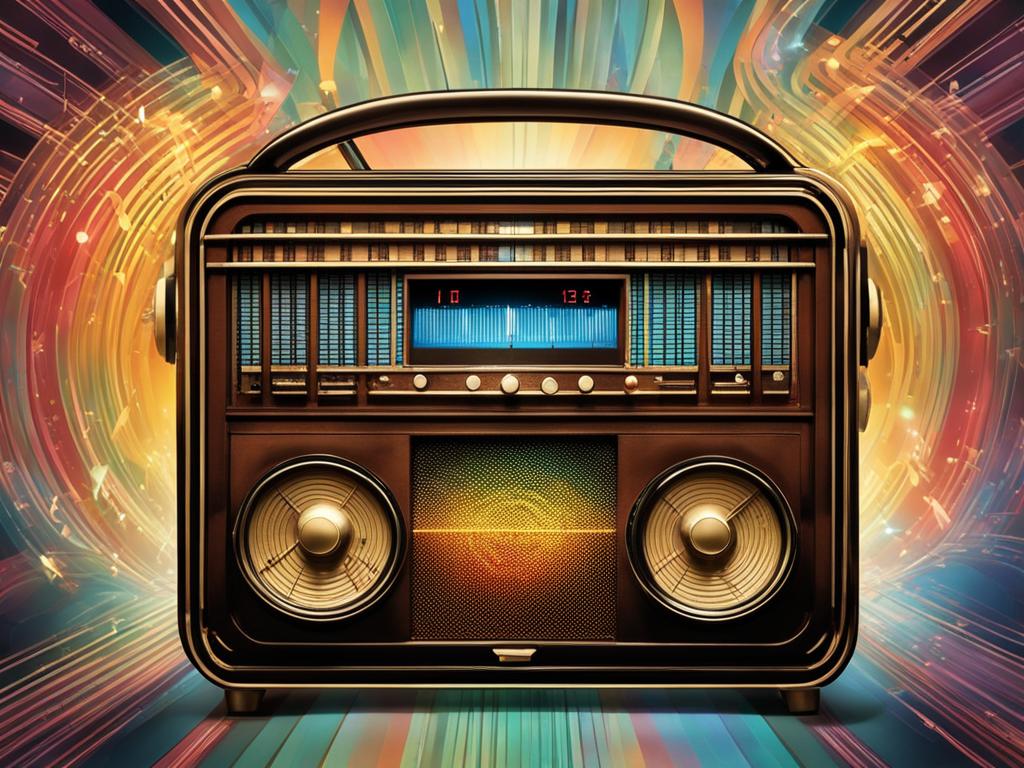Jazz music, with its rich history and captivating rhythm, offers a unique and soulful musical experience. Originating in New Orleans at the beginning of the 20th century, jazz quickly became an international phenomenon, embraced by musicians from diverse backgrounds. Over the years, it has evolved and given birth to subgenres like jazz rap and hip hop soul, influencing other genres of music and earning its place as one of America’s greatest art forms.
From the mesmerizing melodies of jazz instruments to the improvisation that creates musical magic, jazz is a genre that continues to captivate audiences worldwide. With its distinct styles, legendary artists, and timeless masterpieces, jazz has left an indelible mark on the music industry.
So, whether you’re a long-time jazz lover or new to the genre, join us as we explore the soulful world of jazz music, dive into its fascinating history, celebrate its legendary artists, and discover the joy of jazz festivals and radio stations that bring this incredible genre to life.
Key Takeaways:
- Jazz music is a unique and soulful genre with a rich history and captivating rhythm.
- Jazz instruments and improvisation play a significant role in creating magical and spontaneous performances.
- Jazz encompasses a variety of styles, from traditional to contemporary, each with its own distinct characteristics.
- Jazz festivals provide a vibrant platform for showcasing talent and celebrating the spirit of jazz.
- Jazz legends like Miles Davis have made significant contributions to the genre and continue to inspire artists today.
Jazz Instruments and Improvisation: Creating Musical Magic
Jazz music is characterized by its use of various instruments to create magical and improvisational performances. The combination of these instruments and the skillful improvisation of jazz musicians result in a captivating and soulful musical experience.
Table: Jazz Instruments
| Instruments | Description |
|---|---|
| Trumpet | A brass instrument with a bright and piercing sound, often used for melodic solos and improvisation. |
| Saxophone | A versatile woodwind instrument that can produce a wide range of tones and is commonly used in jazz ensembles. |
| Piano | An essential instrument in jazz, the piano provides harmonic foundations and offers opportunities for improvisation. |
| Double Bass | The largest and lowest-pitched string instrument in the jazz ensemble, providing the foundational bass lines. |
| Drums | The rhythmic heartbeat of jazz, drums provide the driving force and add dynamic energy to jazz performances. |
Jazz musicians are known for their ability to improvise, creating new melodies and harmonies on the spot. This improvisation adds a unique and spontaneous element to jazz performances, making each one a one-of-a-kind experience. Jazz improvisation requires a deep understanding of musical theory, an intuitive sense of timing, and the ability to listen and respond to the other musicians in the ensemble.
“Improvisation is one of the fundamental elements of jazz music. It allows us to express ourselves in the moment and create something truly original.” – Jazz musician
Through their improvisation, jazz musicians have the freedom to explore new musical ideas, experiment with different rhythms and structures, and push the boundaries of traditional musical norms. This creative process is what makes jazz music so dynamic and exciting, captivating audiences and inspiring other musicians across genres.
Exploring Jazz Styles: From Traditional to Contemporary
Jazz is a genre of music that has evolved over the years, giving rise to various styles that offer unique characteristics and flavors. From the traditional sounds of Dixieland to the contemporary fusion of jazz with other genres, there is something for every music enthusiast to explore and appreciate.
The Evolution of Jazz Styles
Jazz originated in New Orleans in the early 20th century and quickly found its way into the hearts of music lovers across the globe. Traditional jazz, also known as Dixieland, emerged during this time, featuring lively ensemble playing and improvised solos. It was a vibrant and energetic style that set the foundation for the future of jazz.
As the genre progressed, bebop came into the spotlight, thanks to the pioneering work of artists like Charlie Parker and Dizzy Gillespie. Bebop introduced complex melodies and harmonies, showcasing the technical prowess and creativity of the musicians. Swing, cool jazz, fusion, and free jazz are some of the other styles that have emerged throughout jazz’s rich history.
Jazz Legends and Contemporary Jazz
Legendary jazz artists have left an indelible mark on the genre with their unique styles and contributions. From the iconic Miles Davis, known for his innovative approach and fusion of jazz with other genres, to saxophonist Wayne Shorter and trumpet player Louis Armstrong, jazz legends have shaped the course of music history.
Contemporary jazz takes inspiration from these legends and blends elements of jazz with other genres like rock, pop, and R&B. It offers a fresh and modern take on jazz while still preserving the improvisational nature and soulful essence that defines the genre.
Table: Comparison of Jazz Styles
| Jazz Style | Characteristics |
|---|---|
| Dixieland | Lively ensemble playing, improvised solos |
| Bebop | Complex melodies, harmonies, technical prowess |
| Swing | Upbeat, danceable rhythm, big band ensembles |
| Cool Jazz | Mellow and laid-back, emphasis on subtlety |
| Fusion | Blend of jazz with other genres like rock, funk, and electronic |
| Free Jazz | Experimental, improvisation without traditional structures |
| Contemporary Jazz | Jazz fused with rock, pop, R&B, modern and fresh |
Whether you prefer the classic sounds of traditional jazz or the contemporary fusion of jazz with other genres, exploring the various styles of jazz is a journey that promises a rich and soulful musical experience. From the legendary pioneers to the emerging artists of today, jazz continues to captivate audiences with its timeless appeal and endless possibilities.

“Jazz is not just music, it’s a way of life, a way of being, a way of expressing oneself.” – Unknown
Jazz Festivals: Celebrating the Spirit of Jazz
Jazz festivals are an integral part of the jazz music scene, providing a platform for musicians and enthusiasts to come together and celebrate the spirit of this captivating genre. These festivals are not only a showcase of talent but also a melting pot of creativity, culture, and artistry. From intimate gatherings to large-scale events, jazz festivals offer a unique and immersive experience that captures the essence of jazz music.
One of the most renowned jazz festivals in the world is the Montreux Jazz Festival. Held annually in Switzerland, this iconic event attracts jazz enthusiasts from around the globe. With its picturesque setting on the shores of Lake Geneva and a lineup that features both established artists and rising stars, the Montreux Jazz Festival is a must-visit for any jazz aficionado.
Another legendary festival is the Newport Jazz Festival, which has been a prominent platform for jazz music since its inception in 1954. Located in Newport, Rhode Island, this festival showcases a diverse range of jazz styles and offers a vibrant atmosphere where artists and fans can connect. The Newport Jazz Festival has played a pivotal role in shaping the history of jazz and continues to be a significant event in the jazz calendar.
| Jazz Festival | Location | Year Established |
|---|---|---|
| Montreux Jazz Festival | Montreux, Switzerland | 1967 |
| Newport Jazz Festival | Newport, Rhode Island, USA | 1954 |
| New Orleans Jazz & Heritage Festival | New Orleans, Louisiana, USA | 1970 |
The New Orleans Jazz & Heritage Festival, also known as Jazz Fest, is an iconic celebration of jazz and the rich musical heritage of New Orleans. Held annually during the last weekend of April and the first weekend of May, Jazz Fest brings together jazz musicians, as well as artists from various genres, to showcase their talents on multiple stages. With its lively atmosphere, delicious food, and vibrant culture, Jazz Fest is a true embodiment of the spirit of jazz.
Jazz festivals provide a sense of community and camaraderie among jazz enthusiasts, fostering a shared love for the genre. They offer a unique opportunity to witness live performances, discover new artists, and immerse oneself in the soulful rhythms of jazz music. From intimate jazz clubs to grand outdoor festivals, these events create lasting memories and celebrate the timeless spirit of jazz.

Jazz Legends: Icons of the Genre
The world of jazz is filled with legendary artists who have left an indelible mark on the genre. One such icon is Miles Davis, a trumpet player and composer known for his groundbreaking albums and innovative approach to music. Davis is considered one of the most influential figures in jazz history, and his contributions have shaped the course of the genre.
“Sometimes you have to play a long time to be able to play like yourself.” – Miles Davis
Miles Davis pushed the boundaries of jazz, constantly experimenting with different styles and incorporating elements of rock and funk into his music. His album “Kind of Blue” is widely regarded as one of the greatest jazz albums of all time, showcasing his mastery of improvisation and his ability to create emotive and captivating compositions.
Throughout his career, Davis collaborated with other jazz legends such as John Coltrane, Herbie Hancock, and Wayne Shorter, further solidifying his status as an icon of the genre. His music continues to inspire and resonate with audiences today, making him a true legend in the world of jazz.
Miles Davis’ Discography
| Album | Year |
|---|---|
| Kind of Blue | 1959 |
| Bitches Brew | 1970 |
| A Love Supreme | 1965 |
| In a Silent Way | 1969 |

From his innovative compositions to his mesmerizing trumpet playing, Miles Davis has undoubtedly earned his place among the jazz legends. His music continues to captivate and inspire generations of musicians and jazz enthusiasts alike, cementing his legacy as an icon of the genre.
Jazz Albums: Timeless Masterpieces
Jazz albums are more than just collections of songs; they are works of art that capture the essence of the genre and showcase the talent and creativity of jazz musicians. These albums are revered for their improvisation, intricate compositions, and the unique chemistry between the performers. Each album offers a glimpse into the artist’s musical journey and their ability to push the boundaries of jazz.
One notable jazz album is “A Love Supreme” by John Coltrane, released in 1965. This album is widely regarded as a masterpiece and a landmark in jazz history. It features Coltrane’s powerful tenor saxophone playing, along with his quartet’s tight rhythm section. “A Love Supreme” is known for its spiritual and deeply personal nature, with Coltrane exploring themes of love, devotion, and spirituality through his compositions and improvisation.
“Time Out” by the Dave Brubeck Quartet is another iconic jazz album. Released in 1959, it is best known for its use of unusual time signatures, such as 5/4 and 9/8, which were uncommon in jazz at the time. The album’s standout track, “Take Five,” composed by Paul Desmond, became a jazz classic and is still widely recognized today. “Time Out” showcases the quartet’s impeccable musicianship and their ability to create complex and memorable compositions.
“The Shape of Jazz to Come” by Ornette Coleman is a groundbreaking album that challenged traditional jazz conventions and paved the way for the free jazz movement. Released in 1959, it features Coleman’s unique style of improvisation and composition, characterized by its lack of predetermined chord progressions. The album’s title reflects Coleman’s belief that jazz should constantly evolve and break away from established norms. “The Shape of Jazz to Come” remains a significant influence on jazz and experimental music.
The table below showcases these iconic jazz albums:

These jazz albums continue to resonate with audiences today, showcasing the innovative spirit and timeless appeal of the genre. Whether you’re a jazz aficionado or new to the genre, exploring these masterpieces is a journey of musical discovery and appreciation.
Jazz Radio Stations: Tuning in to the Rhythms
Jazz radio stations provide a gateway for music enthusiasts to immerse themselves in the captivating rhythms and melodies of this soulful genre. With a diverse range of jazz styles, these stations offer a curated selection of both classic and contemporary jazz music, making them a haven for fans seeking an authentic jazz experience.
Listeners can tune in to jazz radio stations such as WBGO (New York), WWOZ (New Orleans), and KJazz (Los Angeles) to discover a world of talented jazz artists and their timeless compositions. From smooth jazz to avant-garde, these stations cater to a wide range of musical preferences, ensuring that there is something for everyone.
Whether you are a long-time jazz aficionado or a newcomer to the genre, jazz radio stations provide a platform for discovery and appreciation. They serve as a medium to connect listeners with the rich history and evolution of jazz music, showcasing the talents of both established jazz legends and emerging artists.
So, if you’re looking to immerse yourself in the soulful melodies and intricate improvisations that define the essence of jazz, don’t forget to tune in to your favorite jazz radio station. Let the rhythms of this captivating genre transport you to a world filled with timeless masterpieces and unforgettable musical experiences.

Jazz Festivals: A Showcase for Jazz Artists
Jazz festivals create an exhilarating environment where jazz artists from around the world can come together to showcase their immense talent. These festivals offer a platform for both established musicians and emerging artists to perform in front of a live audience, allowing them to connect with fans and fellow musicians alike. The vibrant atmosphere of jazz festivals fosters a sense of community and collaboration, where artists can inspire and influence each other, resulting in unforgettable performances.
The Diversity of Jazz Festivals
Jazz festivals come in various shapes and sizes, catering to different styles and preferences. Some festivals focus on a specific subgenre of jazz, such as the New Orleans Jazz & Heritage Festival, which celebrates the rich tradition of New Orleans jazz. Others, like the Montreux Jazz Festival, embrace a broader range of jazz styles, from traditional to contemporary. These festivals often feature multiple stages, ensuring that there is always something for everyone, whether you’re a fan of smooth jazz, bebop, fusion, or any other jazz style.
Furthermore, jazz festivals showcase not only the music but also the culture and history of jazz. They often include educational workshops, masterclasses, and panel discussions, providing a deeper understanding of the genre and its impact on society. Jazz festivals serve as a hub for jazz enthusiasts to immerse themselves in the world of jazz, exploring its roots, evolution, and future possibilities.
| Festival Name | Location | Genre Focus |
|---|---|---|
| New Orleans Jazz & Heritage Festival | New Orleans, Louisiana | Traditional New Orleans jazz |
| Montreux Jazz Festival | Montreux, Switzerland | Wide range, from traditional to contemporary jazz |
| Newport Jazz Festival | Newport, Rhode Island | Mix of traditional and contemporary jazz |
“Jazz festivals provide a unique opportunity for jazz artists to connect with the audience and fellow musicians, creating a sense of camaraderie that is truly special. It’s a chance for us to share our love for the music and create memorable moments on stage.” – Jazz Artist
Attending a jazz festival is not just about the music; it’s an immersive experience that allows you to indulge in the vibrant ambiance and energy that jazz generates. From the mesmerizing performances to the enthusiastic crowd, jazz festivals are a true celebration of the genre and the talented artists who bring it to life. Whether you’re a die-hard jazz fan or simply curious about the genre, a jazz festival is an experience that should not be missed.

Also Read : Rhythm And Blues : Exploring The Heartbeat Of America
Conclusion
Jazz music is a vibrant and evolving genre that continues to captivate audiences around the world. Its rich history and captivating rhythm make it a unique and soulful musical experience. From its origins in New Orleans to its international acclaim, jazz has influenced other genres and is celebrated as one of America’s greatest art forms.
Jazz festivals provide a platform for both established jazz artists and emerging talent to showcase their skill and connect with a live audience. These festivals create a sense of community among jazz enthusiasts and foster collaboration among artists. They are a celebration of the spirit of jazz and allow audiences to experience the magic of live jazz performances.
Jazz radio stations allow jazz enthusiasts to tune in and enjoy the rhythms of this captivating genre. These stations play a variety of jazz styles, from the classics to contemporary jazz, and feature a diverse range of jazz artists. Whether you’re a long-time jazz lover or new to the genre, jazz radio stations provide a way to explore and appreciate the depth and breadth of jazz music.
Whether you’re attending a jazz festival, listening to jazz on the radio, or simply enjoying a jazz album in the comfort of your own home, the spirit of jazz is sure to resonate and leave a lasting impression. Jazz music, with its rich history, diverse styles, and talented artists, has the power to transport listeners and evoke emotion. Experience the soulful rhythm of jazz music today and discover the magic that makes it a truly special genre.
FAQs
Q: What is jazz music?
A: Jazz music is a genre of music that originated in the late 19th and early 20th centuries in the United States. It is characterized by swing and blues notes, call and response vocals, and improvisation.
Q: Who are some of the greatest jazz composers of all time?
A: Some of the greatest jazz composers of all time include Duke Ellington, Charlie Parker, Miles Davis, and Thelonious Monk, among others.
Q: What are some key features of jazz music?
A: Key features of jazz music include improvisation, syncopation, swing feel, and distinct rhythmic patterns.
Q: What age did jazz music originate in?
A: Jazz music originated in the late 19th and early 20th centuries, during the transition from the 1800s to the 1900s.
Q: Which era is often considered the golden age of jazz music?
A: The 1920s and 1930s are often considered the golden age of jazz music, known as the “Jazz Age.”
Q: Where can I find the best jazz music channel?
A: You can find the best jazz music channels on various streaming platforms such as Spotify, Pandora, and JazzRadio.com.
Q: How can I organize a jazz music event?
A: To organize a jazz music event, you can collaborate with local jazz musicians, reach out to music venues, and promote the event through social media and local event listings.
Q: Can I find hand-picked versions of songs by jazz stars?
A: Yes, you can find hand-picked versions of songs by jazz stars on curated jazz playlists on streaming platforms and through specialty jazz record labels.
Q: What are some of the top jazz festivals around the world?
A: Some of the top jazz festivals around the world include the Montreux Jazz Festival, North Sea Jazz Festival, and Newport Jazz Festival, among others.
Q: Are there any specific jazz albums that are considered masterpieces?
A: Yes, there are several jazz albums considered masterpieces, including “Kind of Blue” by Miles Davis, “A Love Supreme” by John Coltrane, and “Time Out” by Dave Brubeck, among others.


